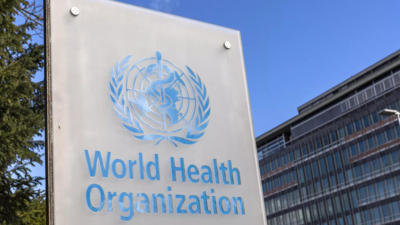- News
- World News
- Rest of World News
- WHO defines diseases spread 'through the air'
Trending
WHO defines diseases spread 'through the air'

NEW DELHI: The World Health Organization (WHO) and approximately 500 experts have reached a consensus on the definition of airborne diseases.
This marks the first time such an agreement has been reached, and it aims to prevent the confusion that occurred during the early stages of the COVID-19 pandemic, which some scientists believe led to unnecessary loss of life, according to a Reuters report.
On Thursday, the WHO released a technical document outlining the new definition, which is considered the initial step towards improving prevention measures for airborne transmission of existing diseases like measles and potential future pandemic threats. The document states that the term "through the air" can be used to describe infectious diseases where the primary mode of transmission involves the pathogen traveling through or being suspended in the air, similar to the use of terms like "waterborne" diseases, which are widely understood across various fields and by the general public.
The new definition was developed with input from nearly 500 experts, including physicists, public health professionals, and engineers, many of whom had previously engaged in heated debates on the subject. Historically, agencies have demanded high levels of evidence before classifying diseases as airborne, which necessitated strict containment measures. The new definition takes into account the risk of exposure and the severity of the disease, in addition to the evidence of airborne transmission.
This marks the first time such an agreement has been reached, and it aims to prevent the confusion that occurred during the early stages of the COVID-19 pandemic, which some scientists believe led to unnecessary loss of life, according to a Reuters report.
On Thursday, the WHO released a technical document outlining the new definition, which is considered the initial step towards improving prevention measures for airborne transmission of existing diseases like measles and potential future pandemic threats. The document states that the term "through the air" can be used to describe infectious diseases where the primary mode of transmission involves the pathogen traveling through or being suspended in the air, similar to the use of terms like "waterborne" diseases, which are widely understood across various fields and by the general public.
The new definition was developed with input from nearly 500 experts, including physicists, public health professionals, and engineers, many of whom had previously engaged in heated debates on the subject. Historically, agencies have demanded high levels of evidence before classifying diseases as airborne, which necessitated strict containment measures. The new definition takes into account the risk of exposure and the severity of the disease, in addition to the evidence of airborne transmission.
Previous disagreements among experts centered around the classification of infectious particles as either "droplets" or "aerosols" based on their size, a distinction that the new definition moves away from. During the early stages of the COVID-19 pandemic in 2020, approximately 200 aerosol scientists publicly criticized the WHO for failing to adequately warn people about the risk of airborne transmission of the virus. They argued that this led to an overemphasis on measures like handwashing, rather than focusing on ventilation, to prevent the spread of the virus.
End of Article
FOLLOW US ON SOCIAL MEDIA











